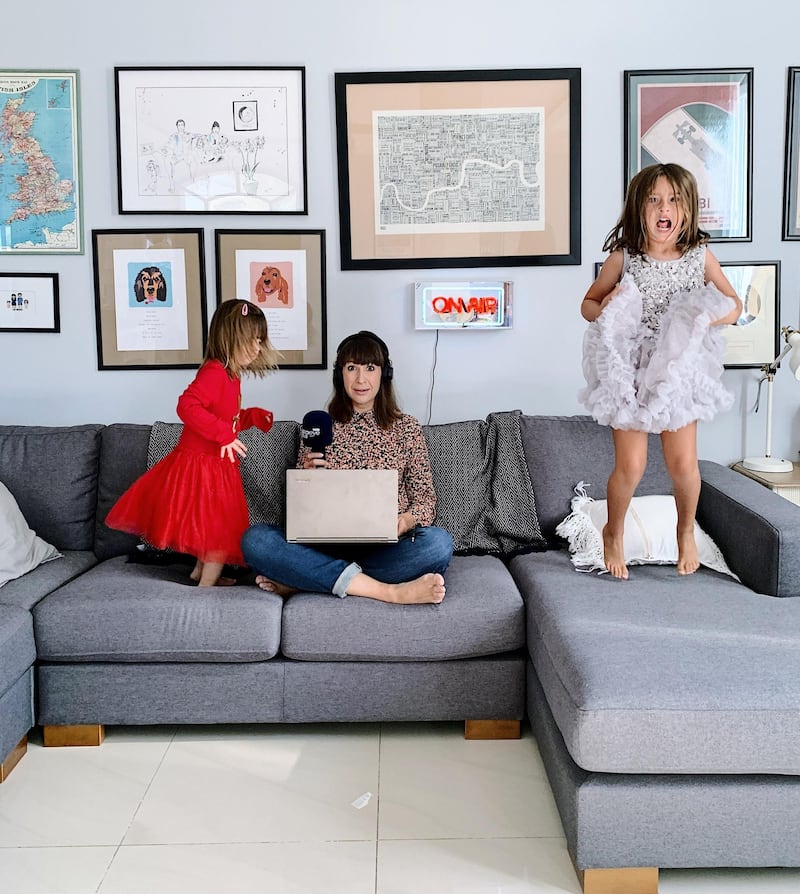It could begin with the smallest thing – a dirty dish in the sink or a sock on the floor. While the act may have previously elicited an eye roll, it suddenly brings with it unprecedented levels of rage. As people around the world, including in the UAE, stay indoors in a bid to contain the spread of the coronavirus, privacy, intimacy and some relationships are taking a hit. Already, China has reportedly experienced a spike in divorce rates, which experts credit to the effect self-isolating can have on couples; after all, it is absence that makes the heart grow fonder.
Two’s a crowd
“Self-quarantining and social distancing means you end up spending a lot more time with your partner. In some cases, it can be good for the relationship as it enables couples to spend more time with one another and can be a wonderful opportunity to connect,” says Dr Sarah Rasmi, psychologist and founder of Thrive Wellbeing Centre. That being said, the prospect of separation or even divorce “is more likely for those who find it difficult to communicate or get easily triggered”, she adds.
Saliha Afridi, clinical psychologist and managing director of The Lighthouse Arabia, explains that the most important rule in these circumstances is to respect each other’s time, space and needs, a fact reiterated by Sarah Curtis, co-founder of Pop Communications. This is the first time Curtis and her husband have had to work from home full-time, and she admits things can get stressful. “We also have my brother who is staying with us and working from home. To add to that, our beloved pooch recently had surgery and is on ‘doggy bed rest’, so it’s a bit of a mad house. Admittedly, I’m a bit of a neat freak, and currently our living room has been transformed into an office, with screens and wires everywhere. I have just had to learn to accept it.”

Ensuring everyone has their own personal space has been key to diffusing stress, says Curtis. While her husband has taken to going out for runs or playing video games after work, she makes it a point to sit in the garden for 20 minutes during her lunch break or spends time there in the morning with a cup of tea, while watching a sitcom. “I think it’s important to take a breath and step back when things are starting to feel stressed. This situation can be challenging because we may feel like we’ve spent the whole day together, but we haven’t really been present because we’re working.”
The solution may lie in setting "me-time" and then "we-time", says Afridi. "The former is when you both are away from each other working on things that you need to do or want to do, while the latter involves doing things together. The responsibility for 'we-time' should be taken by both people."
Rasmi adds that couples can turn the situation around by using it as a time to reconnect. “Express fondness and admiration. Compliment your partner. A simple exercise I do is ask a couple to share two or three attributes they admire about their spouse. Make it a point to share one thing that you appreciate about the person on a daily basis. This positively reinforces the behaviour – and it’s clearly the kind of communication we do like.”
Working families
While having rational conversations and setting boundaries is important among adults, dealing with toddlers and young children is a whole other ball game. Parents, many of whom are working full-time from home, have had to come up with creative ways to keep their little ones entertained.
Helen Farmer, a radio host and founder of the blog themothershipdxb.com, for instance, has taken to reading children’s books on Instagram live to amuse her offspring while also helping other parents. “I love reading, and a lot of parents out there don’t get the time. This way, if they want their kids to watch something other than television, they can leave them in front of the screen,” she says, adding the reaction has been very positive. Other activities the mum of two has devised to keep the children busy include baking, bike rides and having dance parties at home.
Despite this, she adds that working from home with children around has its challenges. “It’s confusing for them because I’m in the house, but I’m not able to play with them.” One solution has been to create a routine. “Schools usually play a huge role in that, and we need to foster that environment as well. We need to create a schedule among the chaos,” Farmer says.
Afridi recommends converting one room into a classroom (use a partition if you don’t have a spare room), and putting signs on doors that are off-limits (such as the space you’ve designated to be your home office). “The more organised you are, the less frustrated you will be,” she says. “Explain that yes, we are all home, but this is not a vacation – it’s a new way of being. Having a schedule and sticking to it will make everyone feel safe and calm.”
Living with flatmates
Not everyone in the UAE can improvise their social-distancing tactics in the company of family or loved ones. With many residents sharing apartments or bed spaces with flatmates, all of whom are suddenly working from home, it’s easy for tempers to flare.
Jessica D’Souza, an advertising professional who stays in a studio with two other women, says privacy can be scarce. “There will be people putting on music or cooking – it can get distracting, especially if someone needs silence and space to get work done,” she says.

The only thing to do in these situations, she says, is to be a bit more considerate to the needs of others. This can entail something as simple as maintaining a low voice, going to a lounge area in case of phone calls and being honest about any grievances.
These are precautions people can take if they get along with their flatmates; if they don’t, Afridi recommends avoiding interaction altogether, or moving in with a friend for a few days or weeks.
“At the end of the day, this is temporary,” she says. “Sometimes, we lose perspective, but remember, this time will not last forever; it will pass and life will go back to normal again.”
Tips to make social distancing easier
Fresh air is a mood-booster. Open the window to let some in, spend time in your balcony or backyard, or go for a drive with the window down.
- Change your language: you are not "stuck at home". You are staying indoors to "stay safe and help the community".
- Practise gratitude - there is plenty to be grateful for - and pay attention to whole picture, not just the negative news.
- Make the most of this time. Many of us have been wishing we had more time to spend with family or take up a hobby, so why not do just that?
- Turn to technology to stay connected. You are not socially isolated; you are in physical seclusion. Download apps that will enable you to engage with others.
Source: Dr Saliha Afridi, The Lighthouse Arabia








